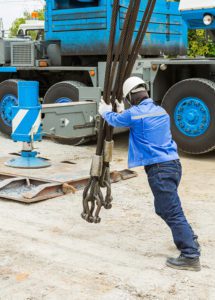Call Us Now1-800-414-2174


Besides assessing the functional capacities of a person to ensure that an employee is physically able to perform the essential functions of a job, one of the primary functions of fitness-for-duty (FFD) tests, at least as practiced by WorkSaver Systems, is to identify whether or not an applicant has a pre-existing impairment and/or disability at the time of hire or return to work. Impairments may not cause a disability to work, but need to be objectively documented to protect against future liability related to accusation that an injury or accident on the job caused the impairment that was pre-existing.
If an occupational disability does exist, the employer is obligated to provide accommodation for work if the accommodation can be reasonably offered. Too often, employers do not conduct fitness-for-duty (FFD) testing and place workers on the job blindly, or if they do conduct FFD tests, the tests are too often inadequately designed to properly identify and measure pre-existing impairments and disabilities. The result is that employers are experiencing more liability claims and are often paying excessive awards for these claims.
Employers should appreciate the real value of knowing and documenting employees’ impairments and disabilities. The value of this knowledge is made apparent by a recent ruling by the 5th Circuit Court of Appeals.
The 5th Circuit Court of Appeals on May 12, 2017, in the case Koch v. USA , addressed the law with regard to a plaintiff with pre-existing conditions which make him more susceptible to disability. In this case, the appeals court affirmed the trial court judgment that the government had failed to prove plaintiff was disabled before the accident. They also affirmed the government did not prove that the pre-existing condition would inevitably worsen without the accident. As a result, the government was liable in full for damages without discount.
Plaintiff Koch fell and suffered personal injuries while aboard the S.S. Altair, a public vessel owned by the United States. Koch was a 54 year-old foreman and employee of Economy Iron Works and was inspecting the vessel to bid on repair work on the vessel. Following a bench trial, the district court determined negligence attributable to the Government—failure to provide adequate lighting of a stairwell—was the factual and legal cause of Koch’s fall, resulting harm, and permanent disability. The court awarded $2.83 million in damages.
The USA Government contended on appeal that, prior to the February 2012 accident, Koch had become disabled by his pre-existing conditions. These included painful chronic osteoarthritis in both his knees, degenerative disc disease in his cervical spine, and carpal tunnel syndrome in his wrists. Koch’s preexisting conditions, or impairments, were not disputed based on medical records, but in the absence of any FFD test to objectively relate the impairments to disability, the district court rejected the argument Koch had been disabled by them prior to his accident.
Although the Fifth Circuit noted that it is a settled principle of tort law that when a defendant’s wrongful act causes injury, he is fully liable for the resulting damage even though the injured plaintiff had a preexisting condition that made the consequences of the wrongful act more severe than they would have been for a normal victim, they noted that there are two exceptions to this general rule.
In the absence of any FFD test or other test to provide objective information on pre-existing disability caused by the plaintiff’s impairments, the 5th Circuit determined that the government had failed to prove the extent of damages the pre-existing conditions would have caused and was fully liable to the plaintiff for his resulting harm and disability. This was even though the preexisting conditions made the consequences of the negligence more severe than they would have been for an ordinary victim. Consequently, the district court ignored the pre-existing medical conditions and concluded defendant’s negligent failure to safely illumine the stairwell was the factual and legal cause of Koch’s accidental fall and its disabling consequences. This cost the defendant a $2.83 million award in damages.
It is opined by WorkSaver that the outcome of this case may have been quite different if the government has not only properly identified and measured pre-existing impairments but also had objectively measured the extent to which pre-existing impairments or medical conditions contributed to disability prior to the accident. A properly performed FFD examination can reveal how an impairment interferes with functional activities such as standing, walking, kneeling, squatting, reaching, bending, lifting, carrying pushing and pulling. Without this information, the employer has no pre-accident or pre-injury disability status baseline to compare to a post-injury or accident disability status. The absence of this information can cost employers hundreds of thousands, if not millions, of dollars in claims.
WorkSaver Employee Testing Systems has provided comprehensive, validated job-specific ADA and EEOC compliant FFD Tests for new hires and return to work cases for industries nation-wide since 1993. In numerous cases, WorkSaver industry clients have not only realized cost savings from marked injury reduction related to proper matching of the employee to the job, but also have experienced tremendous cost savings from having baseline pre-existing impairments and disability properly measured and documented.
For more questions about how WorkSaver can better protect the employee against injury and the employer against unnecessary claims, call WorkSaver at (800) 414-2174 to speak to Dr. Richard Bunch (CEO) or Mr. Trevor Bardarson (President).
The full 5th Circuit Court of Appeals decision in the case Koch v. USA decision can be found here: http://www.ca5.uscourts.gov/opinions/pub/15/15-30811-CV0.pdf
WorkSaver Employee Testing Systems 478 Corporate Dr. Houma, LA 70360
![]()